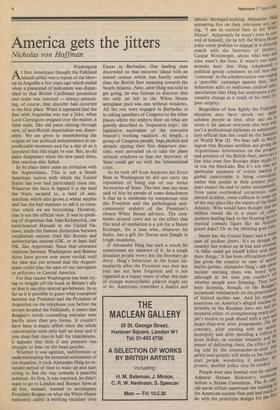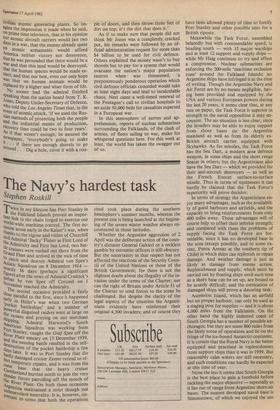America gets the jitters
Nicholas von Hoffman
Washington
At first Americans thought the Falkland Islands affair was a repeat of the blow- up in Anguilla a few years ago which ended when a planeload of policemen was dispat- ched to that British Caribbean possession and order was restored — always presum- ing, of course, that disorder had occurred in the first place. When it appeared that the fuss with Argentina was not a joke, when Lord Carrington resigned over the matter, a faint stain, like old paint shining through new, of anti-British imperialism was discer- nible. We are given to remembering the origins of our political independence at un- predictable moments and for a day or so it appeared that this might be one. But, as old paint disappears when the new paint dries, that reaction also faded.
in its place there came an irritation with the Argentinians. This is not a South American nation with which the United States has ever had particularly close ties. Whatever the facts in legend it is the land the Nazis escaped to, a land of anti- semitism which also grows a wheat surplus and has the bad manners to sell it to coun- tries which we are boycotting. However, that is not the official view. It was in speak- ing of Argentina that Jean Kirkpatrick, our hard-hearted Hannah at the United Na- tions, made the famous distinction between totalitarian nations (bad like Russia) and authoritarian nations (OK, or at least half OK, like Argentina). Since that utterance relations between Washington and Buenos Aires have grown ever more cordial until the idea was put around that the Argenti- nians could play the part of our surrogates or enforcers in Central America.
For that reason Washington has been try- ing to wriggle off the hook as Britain's ally so that it can play neutral go-between. In so far as it is possible to guess what transpired between our President and the President of Argentina on the telephone just before the troops invaded the Falklands, it seems that Reagan's words counselling restraint were hardly more than pro forma. It couldn't have been a major effort since the whole conversation took only half an hour and if you chop that time in half for translations, it appears that little if any pressure was brought to bear on the head gaucho.
Whether it was egotism, indifference or underestimating the potential seriousness of the situation, it took Alexander Haig an ex- tended period of time to wake up and start trying to feel the way towards a peaceful solution. At first, it was reported, he didn't want to go to London and Buenos Aires at all but, instead, wanted to accompany President Reagan on what the White House insistently called 'a working vacation' over Easter in Barbados. Our leading man descended on that innocent island with an armed retinue which was hardly smaller than the British fleet steaming towards the South Atlantic. Next, after Haig was told to get going, he was furious to discover that the only jet left in the White House aeroplane pool was one without windows. All the rest were engaged in Barbados or in taking members of Congress to the other places where the zephyrs blow on what are gravely described as 'inspection trips', the legislative equivalent of the executive branch's working vacation. At length, a group of Congress people, bags packed and already sipping their first departure mar- tinis, were prevailed on to take the plane without windows so that our Secretary of State could get on with the international crisis.
As he took off from Andrews Air Force Base in Washington he did not carry the reputation of being one of our better Secretaries of State. The best that has been said of him by people of some detachment is that he is moderate by comparison with the President and the pathological anti- communist zealotry of the President's closest White House advisers. The com- ments around town are to the effect that this kind of mediation is a job for a Henry Kissinger, for a man who, whatever his faults, has a gift for finesse and finagle in tough situations.
If Alexander Haig has such a touch his countrymen are unaware of it. In a tough situation people worry lest the Secretary go dotty. Haig's behaviour in the hours im- mediately after the President was shot last year has not been forgotten and is not regarded as a happy omen of what this man of strange monosyllabic palaver might say or do. Americans remember a shaken and
almost deranged-looking Alexander Haig appearing live on their television sets say- ing, 'I am in control here in the White House'. Apparently he wasn't even in can' trol of himself, for he left the White House press room podium to engage in a shoaling match with the Secretary of Defence, Caspar Weinberger, about who was and who wasn't the boss. It wasn't too man) months later that Haig telephoned 3 political gossip columnist to tell him that 'someone' in the administration was waging a 'guerrilla' campaign against him. Such behaviour adds to malicious cocktail partY speculation that Haig has undergone a Per" sonality change as a result of his heart bY" pass surgery. Regardless of how lightly the Falklands situation may have struck our upPer echelon people at first, after day six or seven it hit almost everyone else here wh° isn't a professional diplomat or administra' tion official that this could be the Sarajevo of World War III. We hear talk in Wash ington that Russian satellites are giving tne. Argentinians information on the progres' and position of the British fleet; there area few who even fear Russian ships might trY, to run the blockade. But it's not that an} particular sequence of events leading to global catastrophe is being considered' rather that people in their present jitter' state expect the end to come unexpectedlY, from some overlooked occurrence, orriet absurd incident, some collision in some of the way place like the waters of the Soot" Atlantic. Who would have thought that tea million would die in a chain of, conse- quences leading back to the blowing °.`„; musical comedy figure like an Austrian duke? Or so the thinking goes here' Never has the United States had a Norse case of nuclear jitters. It's as though the country has woken up in bed and shouted 'A feller could get hisself killed with thel there things.' It has been officialdom which has given the country its case of atom`` heebie-jeebies. Alexander Haig's talk aht/Li,. nuclear warning shots was heard ber`ii although at the time you couldn't tee whether people were listening. They ban% been listening, though, to Mr Rcaga,': occasional ruminations on the practicalti of limited nuclear war. And his rePeat.„, assertions on America's alleged nuclear,l'e feriority to the Russians have not had intended effect of strengtheningarn ny pod pie's resolve to push ahead with a new ari„e larger-than-ever arms programme. On tle contrary, after starting with an atom monopoly and after spending a trillion more dollars on nuclear weapons and 01_1: means of delivering them, the effect of het ing told by the commander-in-chief th,,, safety and security still elude us has been start people wondering if another aP proach, another policy may be needed. People were also bowled over by retirl Admiral Hyman Rickover's testimon.. before a Senate Committee. The 8I-Yea f old naval officer supervised the building °0 the American nuclear fleet and had much 1,1 do with the prototype designs for the fir' civilian atomic generating plants. So im- agine the impression it made when he said, on prime time television, that in his opinion our atomic aircraft carriers would last two days in a war, that the money already spent on atomic armaments would afford America neither victory nor deterrence, that he was persuaded that there would be a war and that this land would be destroyed, that the human species would be made ex- tinct, and that our best, even our only hope was that we human animals would be replaced by a higher and wiser form of life. No sooner had the admiral finished speaking than the nation heard from T. K. .tones, Deputy Under-Secretary of Defence, Who told the Los Angeles Times that, in the event of atomic attack, 'if we used the Rus- sian methods of protecting both the people and the industrial means of production, recovery time could be two to four years'. As if that weren't enough, he assured the ewspaper, 'everybody's going to make if there are enough shovels to go
around . Dig a hole, cover it with a cou- ple of doors, and then throw three feet of dirt on top; it's the dirt that does it.'
As if to make sure that people did not think Mr Jones was a completely cracked pot, his remarks were followed by an of- ficial administration request for more than $4 billion to be used for civil defence. Others explained the money wasn't to buy shovels but to pay for a system that would evacuate the nation's major population centres when war threatened, a preposterously ponderous operation which civil defence officials conceded would take at least eight days and lead to incalculable chaos. Next came a well-timed renewal of the Pentagon's call to civilian hospitals to set aside 50,000 beds for casualties expected in a European war.
In this atmosphere of nerves and ap- prehension, reports of nuclear submarines surrounding the Falklands, of the clash of armies, of fleets sailing to war, make for whispered questions here. For this week at least, the world has taken the swagger out of us.



































 Previous page
Previous page